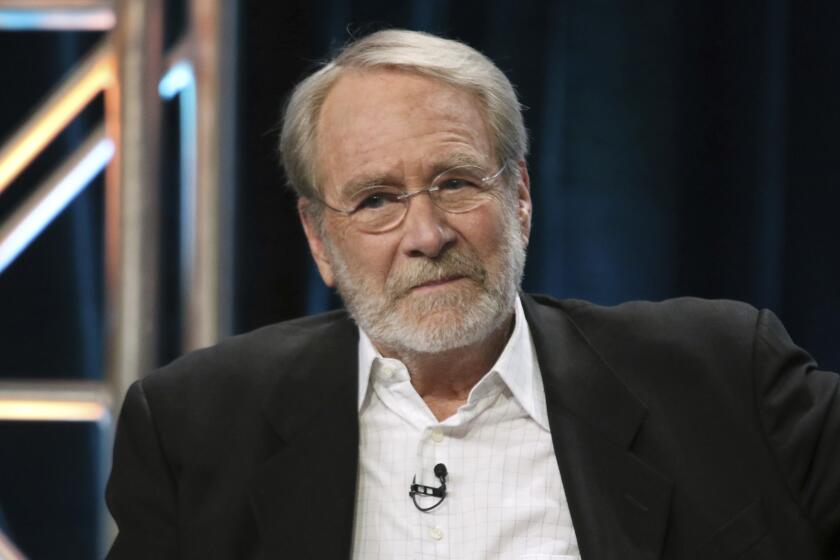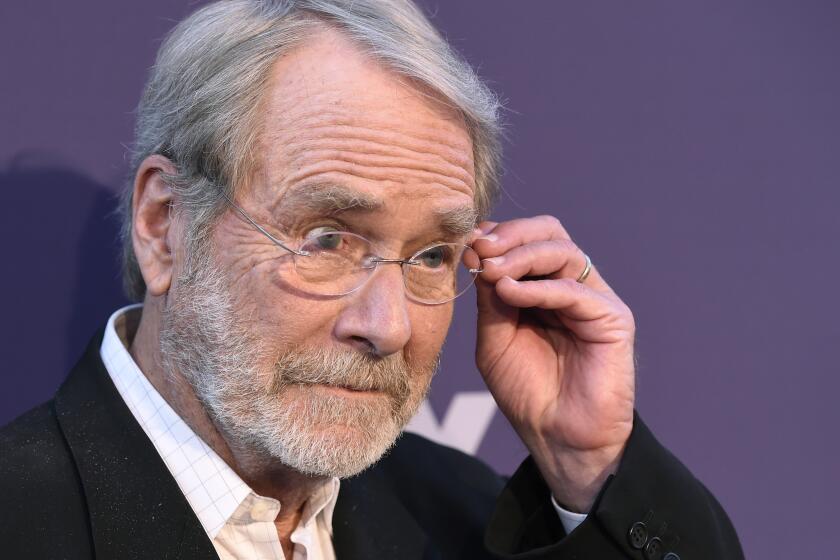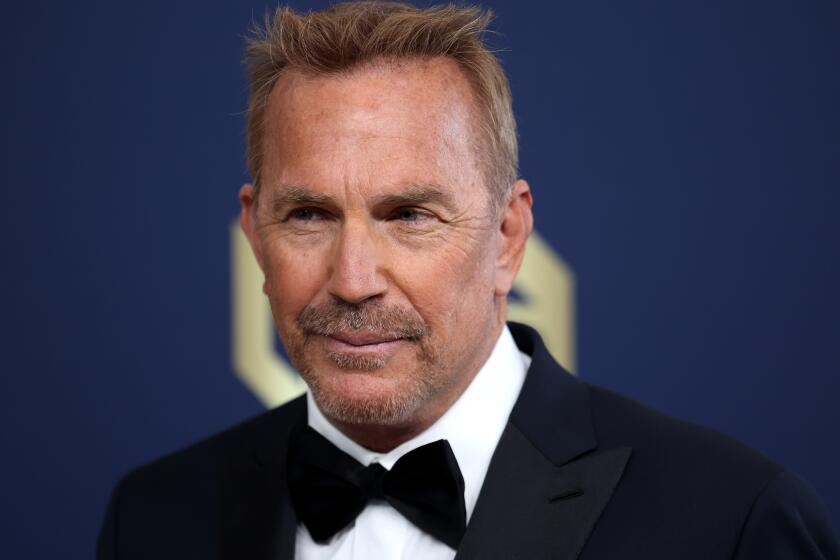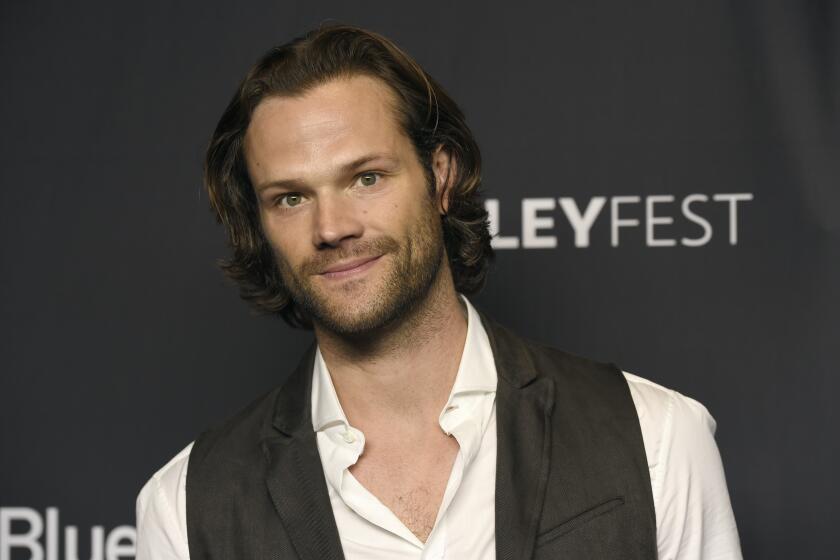From Hired Gun to Top Gun : Thomas Carter has done such good work directing the premiere episodes of other people’s shows--including ‘Miami Vice,’ ‘St. Elsewhere,’ and ‘Midnight Caller’--that he is, finally, going to get one of his own
Ah, the life of a film director. Woody Allen, Louis Malle, Steven Spielberg--they’re rich, they’re famous, they lead glamorous lives with glamorous women. But more important, if their films are critically or commercially successful, they get all the credit.
TV directors? They’re another breed. Some of them are certainly rich. But famous? Quick, name three. Name two. Name one.
In television, the producer is the star. Such names as Steven Bochco, Aaron Spelling and Stephen J. Cannell are the ones that America recognizes as the driving creative forces behind prime-time TV. Sure, once in a while, producers double as directors. But more often than not, the people who direct television shows are hired guns.
Take Thomas Carter. At 36, he is one of television’s most successful directors--the man behind the make-or-break premiere episodes of such notable series as “Miami Vice,” “St. Elsewhere,” “A Year in the Life,” “Call to Glory” and “Midnight Caller.” The six-hour “A Year in the Life” won an Emmy as best miniseries of 1987. Last year, Carter himself was nominated for an Emmy for his direction of “Midnight Caller.”
Still, to the public, he is probably better known as the actor who played Hayward in the late 1970s inner-city basketball series, “The White Shadow.” More often than not, he says, the job of an episodic TV director is to “jump aboard a train moving 100 m.p.h., drive it gracefully for an episode, and then jump off without hurting (themselves) or anybody else.”
For directors, perhaps the best TV job is getting a pilot--the initial episode that either goes on to become a regular series or is abandoned on the TV scrap heap as a good idea that just didn’t pan out. On pilots--and Carter has made a sweet living during the last eight years doing almost nothing else--the director is involved in casting, in set design, in costuming, in creating the entire look and feel of the show that is likely to carry over to all future episodes. On “Miami Vice,” a show synonymous with the word style , Carter, as the director of the pilot, was responsible for much of that style, especially the flashy rock music montages for which the series became renowned.
At the time, TV Guide wrote: “This new NBC cop series staked out a picturesque piece of turf in a moody, inventive two-hour pilot that had a real signature.” Other critics called it “bold, controversial, artfully filmed and sharply directed”; “the scenes are visually stunning and the music blends spectacularly”; “ ‘Miami Vice’ is to look at.” But, while Anthony Yerkovich justifiably garnered plaudits for creating and writing the show and Michael Mann became a household name as executive producer of the series, Carter walked away anonymously to direct other pilots.
“You enjoy being a hired gun for a minute because you know that you have certain bullets that they don’t have. That’s why they hired you,” said Carter, who, wearing jeans, a white T-shirt, black leather jacket and a turquoise-studded bolo tie, projects the cool, laid-back, engaging yet formidable intensity of a born leader. “But after you direct the pilot, you’re out of the mix. The show goes on and you’re kind of watching and rooting for it, and then the producers start doing things that you don’t particularly like, and that’s frustrating.”
The only revenge: Get your own show.
When “Equal Justice” premieres on ABC next month, viewers will see another Carter-directed pilot--a gritty yet coolly stylized look at the underbelly of the criminal justice system, chock full of sensationalized criminal cases tainted with racism, sexism and corruption, with a handful of pretty, bushy-tailed lawyers struggling to survive in a swamp of bureaucracy, sleaze and big city politics. But this time, when new directors start jumping on and off the “Equal Justice” train for subsequent episodes, Carter remains on board as executive producer and head honcho, overseeing everything from the story line to the bookkeeping from his office across the railroad tracks from the show’s production warehouse in the grimy industrial section of downtown Los Angeles.
After years of directing other producers’ pilots and seeing his only feature film project fall apart before he could shoot it, Carter finally secured a deal with ABC to develop a show of his own. The premise was born on a visit home to Texas, where Carter discovered that a friend’s 27-year-old sister, fresh out of law school, was prosecuting major criminal cases as an assistant district attorney in Houston.
“I was used to seeing 50-year-old men on television prosecuting the murderers and the rapists, but that’s not how it is at all. I did some research and discovered that the criminal justice system, which we grow up thinking is so balanced and ordered, is very often sheer chaos. And the opportunity to hold that up for the public to see was very intriguing to me.
“I took the idea to ABC and they weren’t exactly sure because it wasn’t the kind of show they expected from me. It really wasn’t flashy in its immediate style. But they had a lot of faith in me.”
Said Stuart Bloomberg, ABC’s executive vice president for prime time: “Thomas Carter brings a sensibility and style to all his pilots that you are always desirous of maintaining. But when he leaves a series, it seems you have a real struggle to maintain it. By buying a show that he really wanted to do and having him there, you’re assured that his visual tone and his honesty of character will carry over throughout the series. That’s terrific for us.”
With a green light from ABC, Carter needed writers. He happened across an unproduced script by Christopher Knopf and David Simons about the inner workings of the CIA, met them and discovered that they too had been developing a television series centered around the criminal justice system.
Together, they came up with “Equal Justice” (they share the creator credit), and Thomas became one of only a tiny handful of African-Americans--the most conspicuous others being Bill Cosby and Oprah Winfrey, with her upcoming series “Brewster Place”--with ultimate control of their own prime-time series. If “Equal Justice” survives the television ratings wars for a few years, Carter, whose Thomas Carter Co. is producing the series in conjunction with Orion Television, stands to bank a significant chunk of cash.
It’s a long way from Smithsville, Tex. But the story of this young, black man from a small Texas town, who came to Hollywood to be a movie star and ended up working his way to the top of the creative television hierarchy, just might be more compelling than anything Carter and his staff could ever concoct for their show. At the very least, it’s an American dream come true.
Like millions of other children, Carter, whose mother was a schoolteacher and whose father was a laborer who could not read, dreamed of being a rock star. In high school, he saw a production of “West Side Story” and was immediately hooked. “It was incredible,” Carter said. “I wanted to be on that stage and just suck the audience in.”
He studied theater at Southwest Texas State University, then moved to Los Angeles in 1974. He worked as a bus boy, a waiter, a department store clerk. He took acting classes, struggled to get an agent, landed a few small parts, found a bigger agent and in 1978 was finally cast as one of the basketball players in “The White Shadow.”
Dream come true, right? Not exactly.
“I really was an actor. I was young and I really thought acting was the end of it,” Carter said. “And I got on this TV show and I realized, ‘My God, there’s all these other things going on.’ There’s this cameraman and a director and an editor and a sound man and producers with some overall idea, and all those things were coming together to make the show. And I was just this actor who had little to do with all that.”
Carter decided to learn for himself how to put together a TV show. He came in on his days off. He interviewed everyone on the set about their jobs. “He spent a solid year coming to dailies, sitting next to me, and we talked about them every day,” said Bruce Paltrow, the executive producer and occasional director of “The White Shadow.” “And when I directed, I had to get through Thomas to get to the camera. He was always around, looking through the lens, asking endless questions about how we set up this shot, about lighting, why we were doing it this way instead of that.”
During the show’s second season, Paltrow gave Carter, then 26, a chance to direct. At first he didn’t like it. “It was hard,” Carter remembers. “There was a schedule to meet, and I was responsible for all these other people and if we didn’t meet the schedule it was my fault. I had to be there all day, every day. Acting was easier.”
And even when he knew what the shot should look like, he didn’t always know how to get it. In one scene that first time out, he wanted heat waves coming off the pavement as two guys walked toward the camera from far down the street. Carter said he knew he’d seen it somewhere. Paltrow said they’d done something similar in the pilot. But Carter had no idea that it would take a long 250-millimeter lens to do it.
“You learn those mechanics as you go along,” Carter said. “I’m probably still learning now. But I found that I had a certain knack for it. I think I understood somehow that my job as a director was to take what was written and try to say it in a way that went beyond the words. To enhance the words by figuring out how I can say the same thing with where I put the camera or with the colors I choose or how we use sound or music. Once you start playing the game that way, film making becomes so much fun.”
Still, even with all his untapped talent, Carter was lucky he worked for Paltrow. African-Americans still have an inordinately difficult time finding directing jobs in television. When Carter got his break 10 years ago, it was almost unheard of.
Through the years, Paltrow has earned a reputation as a man who gives black directors their first chance. Kevin Hooks, another actor from “The White Shadow,” and the Emmy-nominated Eric Laneuville, a cast member from Paltrow’s “St. Elsewhere,” can both trace the genesis of their TV directing careers to him. And Paltrow can list at least half a dozen other minority directors, including black women, whom he also launched.
After Carter’s first show, assignments poured in like the streams of filtered light that he used as a signature for the late-night radio scenes in “Midnight Caller.” He directed more episodes of “The White Shadow,” several hours of “Fame” and then 10 episodes of “Hill Street Blues.” Carter was forced to choose directing over acting almost by default. He ended up working so much as a director, he simply didn’t have time to go on auditions.
Carter found himself in such high demand that he rarely had to wonder whether bigotry was the reason he was passed over for this job or that. He said he does remember an agent telling him that certain producers refused to hire black directors, and occasionally, on the set, he had to endure belligerence and racial slurs from crew members who apparently resented both his youth and the color of his skin.
Though attitudes and hiring practices in Hollywood have improved over the years, Carter says that racism still pervades the upper echelons of the business. “The industry is not really interested in giving blacks or anybody else a chance to prove themselves,” Carter said. “The industry as a whole is interested in what it’s always been interested in: making as many millions of dollars as it can make. It doesn’t mind making millions off of black talent. But, funny enough, no matter how much money black talent makes in music or film or TV, I think it’s still largely a closed shop.”
Carter acknowledges that now that he has attained a position of authority, he has an obligation to be part of the solution. “I have hired two black directors on our show. I have not hired a woman to direct, and I’m sorry that I haven’t done that yet.”
Carter earned his chance to open doors for others on the merits of a string of TV successes that writer-producer Joshua Brand likens to Joe DiMaggio’s 56-game hitting streak. Beginning with “St. Elsewhere” in 1982, Carter has directed seven consecutive pilots that have gone to series. He’s never missed.
“He’s a very talented guy with a strong visual sense,” said Brand, who hired Carter for “St. Elsewhere” and “A Year in the Life.” “But he also knows how to service the material. ‘Miami Vice’ was all about style. ‘Year in the Life’ was people talking in rooms. His ability to make the cinematic style fit the material, rather than imposing his own flair and style on the material, reflects his intelligence and just how gifted he is.”
One of Carter’s complaints about television over the years has been that, for the most part, TV shows rarely combine a real cinematic flair with strong “literature.” “Miami Vice” and “Midnight Caller” certainly allowed him to display all of his cinematic razzmatazz, but they were not strong, Carter said, in a literary sense. “St. Elsewhere” and “A Year in the Life” were basically the opposite.
But even with those character-driven dramas, Carter never failed to strut some of his cinematic virtuosity. His favorite moment from “A Year in the Life” is a sequence in which a lost and failing adult man relives his triumphant at-bat in a high school baseball game. Setting the scene to Peter Gabriel’s song “Mercy Street,” Carter resurrected the presence of the other players and the crowd by placing the camera in specific spots on the empty baseball field. Then, without a word of dialogue, he convincingly evoked the thrill of the man’s at-bat, his running the bases and his heroic steal of home.
“Directors love that kind of stuff,” Carter said with a big grin.
Though “Equal Justice” might suffer, at least initially, by comparison to the accomplished storytelling of “Hill Street Blues” and “L.A. Law,” it is, Carter says, an attempt “to marry film style, color and design with strong ideas and literary substance. You don’t see that much on television--or in the movies, for that matter.”
Carter concedes that moving from the director’s chair to the executive producer suite has been more taxing than he expected. His white Reeboks endure quite a workout during his daily 14-hour marathons from story meetings to casting sessions to the editing room and then down to the set to consult with actors and directors and back again.
“It’s exhilarating,” Carter said. “And it’s also a little bit frustrating because I consider myself a film maker first, but on a weekly series I can’t do everything. While I’m here doing an interview, some other director is down there on the set. I’m not there positioning the camera, choosing the lens, extracting a certain nuance from each actor, and yet I’m responsible for all those things. I’m involved, but I’m often once removed. That’s a new feeling for me.”
Carter credits a never-say-fail attitude for his against-the-odds accomplishments. He says he never entertained doubts about achieving his dreams because, as he slowly climbed his way into the proximity of actors and directors and others with jobs he coveted, he “started to think, ‘Hey, if this guy can do it, I’m sure I can do it too.’
“Part of the problem with this society is that there are so many people that are isolated from ever knowing a congressman or a doctor or a movie producer, and so the notion of becoming one is such a distant notion. But when you get close to those people, you realize that they are no brighter than you are. You are suddenly able to believe that maybe you can do it too. And believing that is everything.”
The complete guide to home viewing
Get Screen Gab for everything about the TV shows and streaming movies everyone’s talking about.
You may occasionally receive promotional content from the Los Angeles Times.



